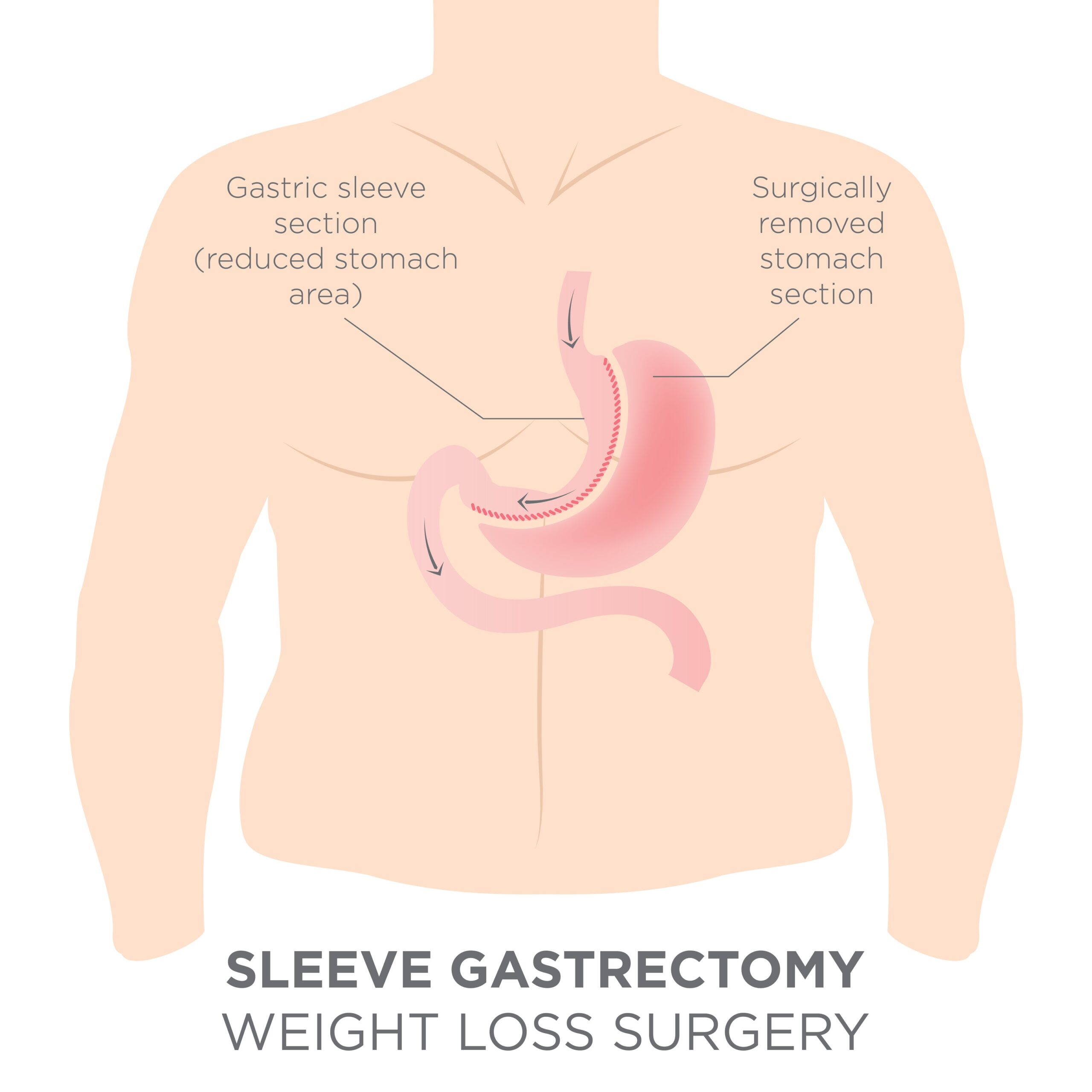Gastric sleeve surgery, also known as sleeve gastrectomy, involves removing 80% of the stomach, limiting the amount of food a patient can consume. The gastric sleeve recovery process plays a vital role in achieving long-term success after this weight loss surgery. Understanding the gastric sleeve recovery time and what to expect can help patients prepare for a smooth postoperative journey.

Immediate Post-Surgery Care: Navigating the First 48 Hours
After gastric sleeve surgery, patients typically stay in the hospital for a day, however it is increasingly common to perform same day surgery.
Movement is encouraged, even during the first day, to help reduce the risk of blood clots and promote healing. Light walking with assistance starts in the recovery room and helps improve circulation. It’s also important to keep an eye out for symptoms like shortness of breath, increasing pain, or a high fever, as these could signal complications. A liquid diet is typically started, consisting of water and clear fluids to keep the body hydrated while minimizing strain on the stomach. This is the diet for the first several days and then patients progress to thicker shakes and soups.
Taking the First Steps in Your Recovery: Healing & Adjusting
The first week post-surgery is vital for healing and adapting to new dietary habits. While rest is essential, light walking is encouraged to promote faster healing. Pain is common but manageable with prescribed medications.
Strict adherence to dietary changes is crucial. Patients are restricted to a liquid-based diet to avoid placing stress on the stomach, which is still healing. Clear liquids, such as water, broth, and sugar-free drinks, should be consumed in small amounts to prevent dehydration and support recovery.
During this phase, the amount of food intake is minimal, as the body adjusts to the reduced stomach size. Patients should gradually progress from clear liquids to more nutrient-rich liquids like protein shakes. Staying hydrated and focusing on proper nutrition is key. Extended hospital stays are uncommon unless complications arise. Any severe pain, persistent nausea, or other unusual symptoms should be promptly reported to a healthcare professional for proper management.
Weeks 2-4 Post-Op: Nutrition & Recovery After Gastric Sleeve
As patients transition from liquids to soft foods, weeks two to four post-op focuses on proper nutrition and continued healing. Soft foods, such as mashed vegetables and pureed proteins, are introduced slowly to avoid complications. It is critical to follow the prescribed amount of food intake to prevent stretching the newly formed stomach pouch.
Vitamins and minerals supplements, such as B12 and iron, are typically introduced to ensure proper nutrition. Regular follow-up appointments are essential during this phase to monitor the patient’s progress.
Balancing Recovery & Routine: Resuming Normal Activities
By the end of the first two weeks, most patients feel stronger and begin integrating light exercise into their routine. The timeline for returning to work varies depending on the job’s physical demands, but many patients can return to work within 2 to 3 weeks, particularly for less physically demanding roles. Everyone’s motivation for work is different!
Sustaining Progress: Diet & Exercise for Long-Term Health
By the three-month mark, most patients have adjusted to their new lifestyle and diet. Long-term gastric sleeve recovery is about maintaining a healthy balance of weight loss and nutrition. Patients continue to consume smaller portions and must adhere to dietary guidelines, which limit sugars and processed foods. Bowel movements typically normalize, and any issues with digestion should be monitored.
At this stage, maintaining regular exercise and ensuring adequate intake of vitamins and minerals become part of the patient’s routine to ensure long-term health and avoid nutrient deficiencies.
Tips for a Smooth Recovery
- Follow Dietary Guidelines: Adhering strictly to the recommended diet progression ensures proper healing.
- Stay Hydrated: Drink liquids and avoid dehydration.
- Listen to your body – rest when necessary
- Take Your Vitamins: Supplement your diet with necessary vitamins to avoid deficiencies.
- Regular Follow-Ups: Regular check-ups with your healthcare professional ensure you’re on track for recovery and achieving your weight loss goals.

When to Contact a Doctor
Post-surgery, it is essential to remain vigilant for potential complications. Contact your doctor if you experience:
- High fever
- Severe nausea or vomiting
- Persistent pain not relieved by medication
- Infection at the incision site
- Difficulty with bowel movements
These symptoms could indicate a complication, such as infection or other serious concerns. Immediate consultation with your healthcare provider will ensure prompt intervention.
Diet and Nutrition Guidelines
You’ll have to significantly change your eating habits after your surgery, which will likely be a large adjustment. Here’s a short list of the changes you can expect:
- Eat very slowly
- Eat only small quantities of food at a time, and keep in mind that your new stomach is much smaller
- Chew thoroughly and don’t swallow your food until after you have thoroughly chewed it to a mashed consistency
- Don’t eat and drink at the same time, as this can cause food to move through your new stomach too quickly; instead, drink a beverage about 30 minutes before you eat a meal

Recovering from gastric sleeve surgery is a gradual process that requires dedication to diet, exercise, and regular medical care. By following your surgeon’s guidelines and paying attention to your body’s needs, you can ensure a successful recovery and meet your long-term weight loss goals.
You might also be interested in: Gastric sleeve: The best bariatric surgery for your body AND your wallet

